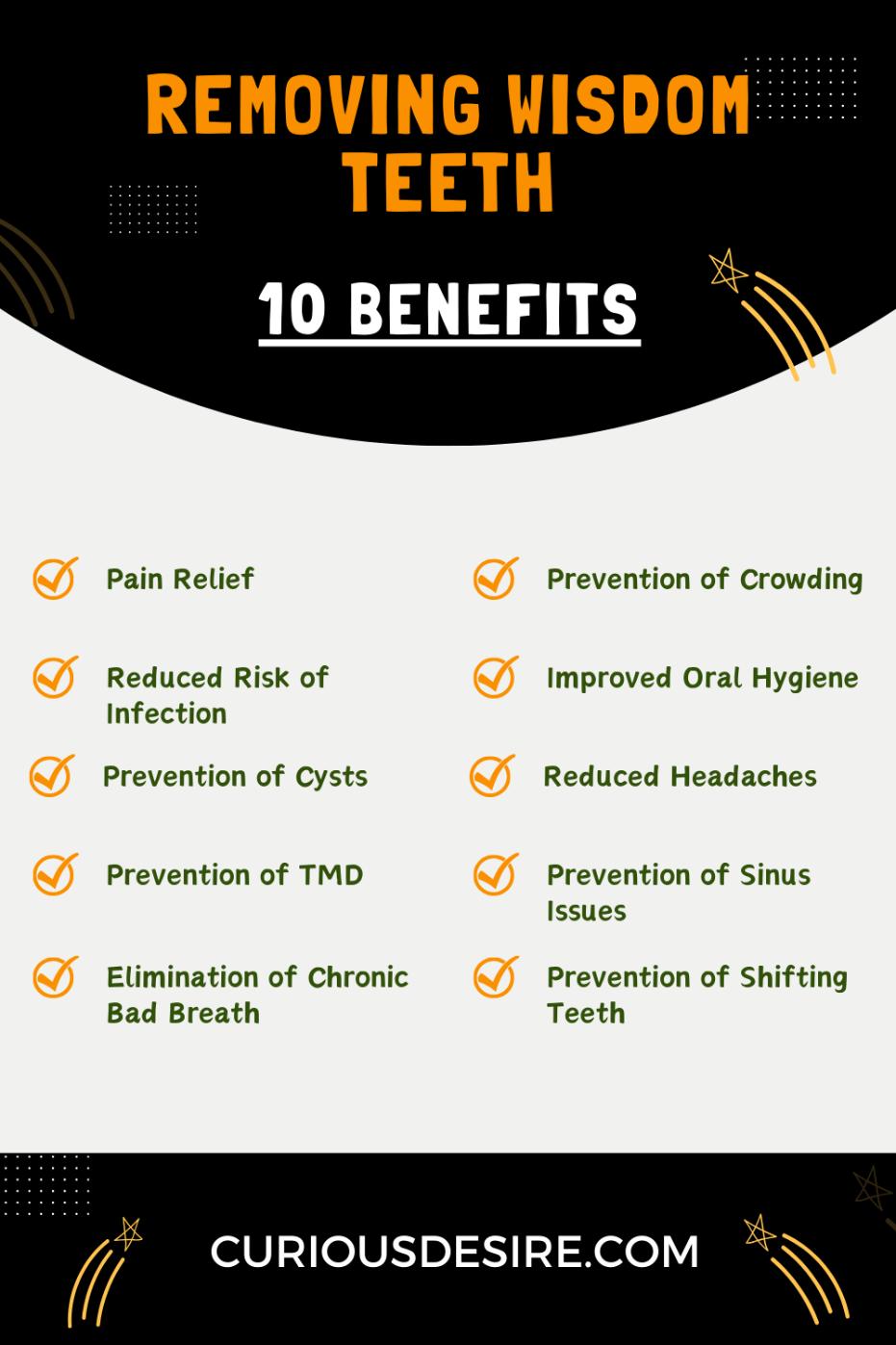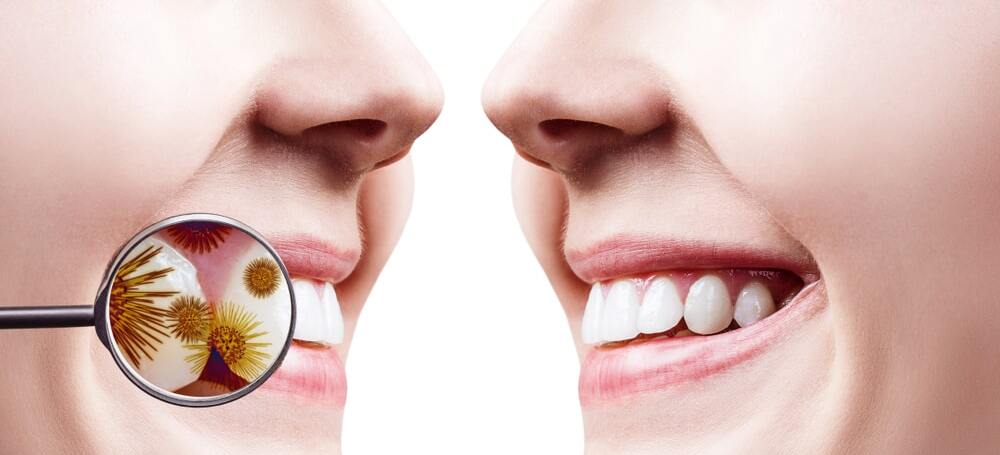Wisdom teeth, also called third molars, are the last set of molars that usually show up in your late teens or early twenties.
Even though they help with chewing, they can cause problems like getting stuck or growing in the wrong way.
That’s where the removal of wisdom teeth comes in – a common dental procedure recommended by dentists to deal with different oral health issues and avoid potential problems.
In this blog post, we’ll look into the many benefits of removing wisdom teeth, explaining how this regular dental practice helps keep your overall oral health in check and stops future dental problems.
Here are the top 5 benefits of removing wisdom teeth:
- Pain Relief
- Reduced Risk of Infection
- Reduced Headaches
- Elimination of Chronic Bad Breath
- Prevention of TMD
[toc]

Wisdom teeth, when impacted or misaligned, can create tight spaces that are challenging to reach with a toothbrush or dental floss.
This difficulty in cleaning may lead to the accumulation of plaque and bacteria, increasing the risk of cavities, gum disease, and other oral health issues.
By extracting wisdom teeth, individuals can eliminate these hard-to-reach areas, facilitating more effective brushing and flossing routines.
Persistent bad breath, known as halitosis, can stem from infections or decay related to impacted wisdom teeth.
The challenge of cleaning around these molars allows the buildup of bacteria and debris, contributing to unpleasant breath odor.
Fortunately, wisdom tooth removal provides a solution by eliminating the source of infection and decay. This not only addresses chronic bad breath but also promotes a fresher breath.
The positive change extends beyond oral health, positively impacting personal interactions and enhancing social confidence.
Research from A Plus Dental emphasizes that bad breath is more than just a hygiene issue; it can act as a social confidence killer, potentially affecting relationships and social life.
Therefore, maintaining fresh breath is crucial not only for oral health but also for confidence in social situations.
Removing Wisdom Teeth Benefits FAQs
1. Is it beneficial to remove wisdom teeth?
Yes, removing wisdom teeth can be beneficial in preventing potential issues such as impaction, pain, infections, and overcrowding.
2. Is it luck to remove wisdom teeth?
The removal of wisdom teeth is not associated with luck. It is a routine dental procedure done for oral health reasons.
3. Why do experts now say not to remove your wisdom teeth?
There is no widespread consensus against wisdom tooth removal among dental experts. Recommendations may vary based on individual cases.
4. What are the side effects of getting your wisdom teeth removed?
Common side effects include swelling, pain, bruising, and difficulty opening the mouth. Serious complications are rare.
5. Does removing wisdom teeth affect face shape?
Wisdom teeth removal typically does not affect face shape. Any changes are usually minimal and not noticeable.
6. Does wisdom teeth removal affect the jawline?
Wisdom teeth removal generally does not impact the jawline.
7. Should I get 2 or 4 wisdom teeth removed?
The decision to remove 2 or 4 wisdom teeth depends on factors such as their condition and the dentist’s recommendation.
8. How long does wisdom teeth recovery take?
Recovery can take about 1-2 weeks, but individual experiences may vary.
9. Can I brush my teeth after wisdom teeth removal?
You can usually resume gentle tooth brushing after wisdom teeth removal, but follow your dentist’s instructions.
10. Can you talk after wisdom teeth removal?
Yes, you can talk after wisdom teeth removal. There might be some discomfort, but it shouldn’t prevent normal speech.
11. Should I get all 4 wisdom teeth removed at once?
Getting all 4 wisdom teeth removed at once is common and may reduce overall recovery time.
12. Why is it called wisdom teeth?
Wisdom teeth are so named because they typically emerge in early adulthood, considered the “age of wisdom.”
13. What are the first signs of wisdom teeth coming in?
Signs include pain, swelling, redness, and difficulty opening the mouth.
14. How painful is wisdom tooth extraction?
Pain during wisdom tooth extraction is usually managed with local anesthesia. Post-surgery discomfort can be managed with prescribed medications.
15. Does removing wisdom teeth make the face thinner?
Wisdom teeth removal typically does not make the face thinner.
16. Which is more painful, a root canal, or wisdom tooth extraction?
Pain perception varies, but both procedures are typically managed well with anesthesia. Neither should be excessively painful.
17. What is the most painful part of wisdom teeth removal?
The extraction itself is not typically painful due to anesthesia. Post-surgery, swelling, and discomfort may occur.
18. Which is worse, upper or lower wisdom teeth?
Neither upper nor lower wisdom teeth removal is inherently worse. It depends on the individual case.
19. Do top or bottom wisdom teeth heal faster?
Healing time for top and bottom wisdom teeth removal is generally similar.
20. What is the fastest way to recover from wisdom teeth removal?
Follow post-operative care instructions, rest, and avoid strenuous activities for a quicker recovery.
21. What happens if food gets in the wisdom tooth hole?
Rinsing the area gently with warm salt water can help remove food particles. Avoid poking the area with objects.
22. What does a healthy wisdom tooth hole look like?
A healthy wisdom tooth hole appears clean, without excessive redness, swelling, or pus.
23. What happens to the hole after tooth extraction?
The hole gradually fills with a blood clot, which develops into soft tissue, eventually healing and closing.
24. What is the white stuff on my wisdom teeth?
The white stuff on wisdom teeth could be plaque or debris. Regular brushing and flossing can help prevent it.
25. What is the white stuff in my wisdom teeth removal?
White stuff may indicate healing tissue or debris. Consult your dentist if concerned about post-removal changes.
26. How do I know my socket is healing?
Signs of healing include reduced swelling, pain, and the development of pink, healthy tissue. Follow up with your dentist for assurance.
Resources Consulted
- Verywell Health
- VC Dental – Tooth Anatomy Education
- Encyclopedia Britannica – Molar
- ScienceDirect – Molar Tooth
- North Texas Oral Surgery – Wisdom Teeth Cause TMJ Disorder
- Winchester Dental – TMJ Disorders & Wisdom Teeth Extractions
- PubMed Central – Wisdom Teeth Extraction and TMJ Disorders
- ScienceDirect – Mandibular Third Molar
- PubMed – Factors Influencing Impaction of Mandibular Third Molars

